Evaluating Country Programmes - OECD Online Bookshop
Evaluating Country Programmes - OECD Online Bookshop
Evaluating Country Programmes - OECD Online Bookshop
Create successful ePaper yourself
Turn your PDF publications into a flip-book with our unique Google optimized e-Paper software.
<strong>Evaluating</strong> <strong>Country</strong> <strong>Programmes</strong><br />
120<br />
Also, for the CPE Egypt, such a policy report has been sent to Parliament which<br />
will be discussed at short notice by the Standing Committee on Foreign Affairs.<br />
The Minister’s policy reaction on the CPE Egypt includes a number of intentions<br />
and proposals to increase the relevance, effectiveness and efficiency of<br />
development co-operation with Egypt. Further details about future policy will<br />
become available after discussions in Parliament and consultations with the<br />
Egyptian Government. Therefore, the aspects mentioned below are provisional.<br />
These include:<br />
– The fragmentation of the country programme, due to the large number of<br />
diverse projects, will be further reduced. Attempts have been made in<br />
recent years to streamline the programme.<br />
– This process of bringing more cohesion and coherence to the aid programme<br />
will be based on a careful selection of a limited number of priority sectors,<br />
for which sector support documents will be produced.<br />
– These documents will be based on the Egyptian Government’s policy<br />
papers, some of which have been announced already, e.g. those for agriculture<br />
and health.<br />
– They will specify ways and means to realise joint Egyptian-Netherlands’<br />
development priorities such as poverty alleviation, institutional strengthening,<br />
improvement of the position of women and environmental conservation.<br />
– The Egyptian Government’s privatisation policy, indicating the focus of the<br />
public sector on key activities and tasks, will be further supported; relevant<br />
experiences in projects supported by the Netherlands will be communicated<br />
through the appropriate Egyptian channels for the elaboration of<br />
policies.<br />
– The geographical concentration of the Netherlands’ aid in the Fayoum Governorate<br />
will be continued, and more attention will be given to ways and<br />
means to realise the value-added of geographical concentration at governorate<br />
level.<br />
– Monitoring of aid activities will be improved by focusing more on output and<br />
effects of aid, especially regarding poverty alleviation and improvement of<br />
the position of women.<br />
Conclusions<br />
<strong>Country</strong> programme evaluation in the Netherlands’ development assistance<br />
has been comprehensive, complex and time-consuming. The CPE for Egypt lasted<br />
for almost three years, cost almost USD0.8 million and involved 25 consultants of<br />
whom 15 were from Egypt. The reason for the long duration was threefold: the wide<br />
scope and ambitious objectives of the evaluation; the complexity of the aid programme<br />
for Egypt; and intensive consultations with stakeholders in host countries.<br />
<strong>OECD</strong> 1999






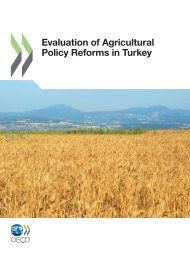
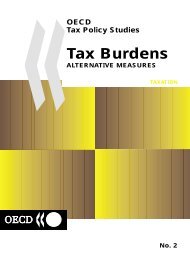

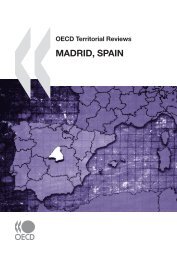



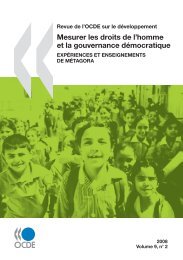
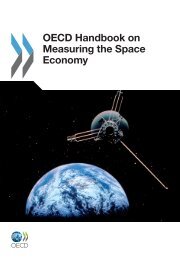
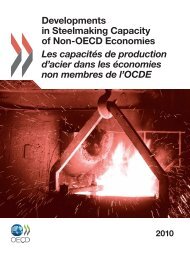

![CQE=U]^\]Z: KAZAKHSTAN - OECD Online Bookshop](https://img.yumpu.com/3915768/1/190x253/cqeuz-kazakhstan-oecd-online-bookshop.jpg?quality=85)